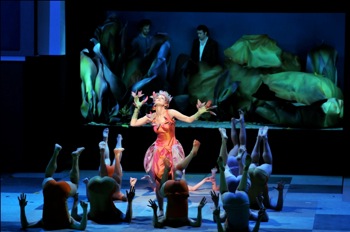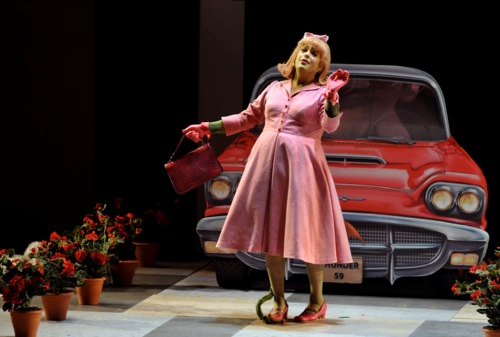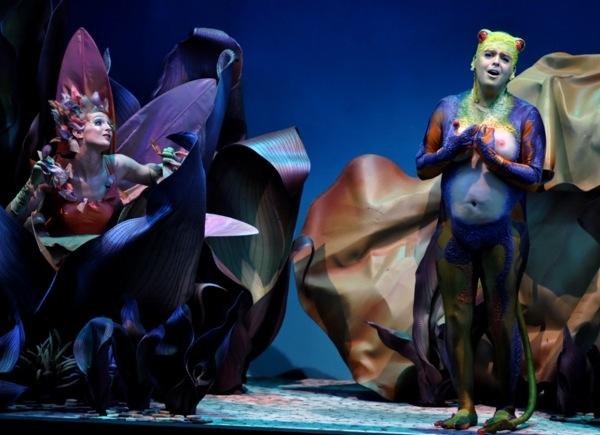French geography has a significant hand in the small but exuberantly formed opera and dance that comes out of that civilised country - scaled for the important theatres that lie far beyond Paris and which have a great deal to teach Britain about creating a vivid national landscape. Opera du Rhin’s smashing new production of Rameau’s Platée in Strasbourg is produced for small theatres but with not the slightest diminution of vitality and ingenuity, and if you didn’t catch it streamed live last week on arteliveweb.com or in its home theatre in Strasbourg, then you can still speed to Mulhouse quickly for that rarity, a properly funny Platée. And why would you? Because the two driving creative forces will soon be in Britain.
Christophe Rousset is a William Christie protegé who in 1991 set up Les Talens Lyriques, a small theatrically driven baroque music ensemble which injects new life into old operas with the delicately passionate responsiveness of his direction and the clean individuality of sound that emerges from his two dozen or so instrumentalists on period instruments. He will be doing Handel's Semele in July at the Barbican while Platée’s director Mariame Clément is said to be working with Glyndebourne Touring Opera next year. This Strasbourg staging indicated that both are electric sparks of freshness able to light up small theatres and small budgets with big effect, rather in the style of Matthew Bourne or Rupert Goold - where theatre, singing and movement meet unafraid of making modern theatre out of old pieces.
 Platée is a ruthless tale of marital gamesmanship between some very fishy characters, from idle gods to conceited frogs. Written for a royal divertissement in 1745, its joie de vivre comes from Rameau’s zippy economy - bursting with tunes and ideas, he never dallies with one long before ushering the next one in, and the effect is of a divertingly rich musical cartoon in which you long to stop and stay awhile with, say, the heartstopping Purcellian gravity of the chorus “Hymen, l’amour t’appelle” which so briefly halts the hyperactive mayhem. There are several testing vocal roles, most spectacularly the soprano coloratura role of Folie and the title part for a high tenor with large physical confidence.
Platée is a ruthless tale of marital gamesmanship between some very fishy characters, from idle gods to conceited frogs. Written for a royal divertissement in 1745, its joie de vivre comes from Rameau’s zippy economy - bursting with tunes and ideas, he never dallies with one long before ushering the next one in, and the effect is of a divertingly rich musical cartoon in which you long to stop and stay awhile with, say, the heartstopping Purcellian gravity of the chorus “Hymen, l’amour t’appelle” which so briefly halts the hyperactive mayhem. There are several testing vocal roles, most spectacularly the soprano coloratura role of Folie and the title part for a high tenor with large physical confidence.
Platée means, as much as anything, "flattened", which is certainly what she is by the end, not entirely her own fault. She's a vain waternymph - more of a frog, really - who is set up as a fake mistress for Jupiter in order to annoy his paranoid wife Juno. In the late 1990s the great American choreographer Mark Morris created a dance farce out of it, with an emphatically reptilian “heroine” and a refreshing cascade of cute or sly choreography. The coterminous Paris Opera staging by Laurent Pelly, filmed on DVD, has flamboyant era-crossing costumes and a faintly Kermit-like Platée. Opera du Rhin’s production makes a virtue of being small, smart and very transportable, by finding a remarkably convincing modern context for this wacky story.
Clément has relocated the story into Fifties America, to make a jolly satire on the burgeoning consumer society. The gods are versions of Mad Men, overpaid, underworked, highly groomed, louchely cooking up marital conspiracies and downfalls between cocktails simply to pass the time. Jupiter and Juno are the hosts, but on non-speakers, and the guests mostly side with the promiscuous Jupiter against his righteously jealous wife - no doubt as true in the 1950s as it was in the 1750s.
 Hapless Platée is the harmless occupant of the aquarium in their bedroom - and she gets fished out by two of the more mischievous guest divinities and turned life-size, in order to be the patsy for their hosts. This is all most entertainingly staged with the aquarium presented in two sizes simultaneously: on human scale (small) and on frog scale (large). With a froggy head, a long lizardy tail and fat female breasts and tum, she is perhaps more a eunuch than a girl, and, dripping with vanity, she is a figure ripe for mockery by all. While not all the casting in Strasbourg was tip-top, Emiliano Gonzalez Toro was a peach of a Platée - he has not only a voice of plangent beauty and flexibility in expressiveness, but a chubby appealing face that you couldn’t help loving. Even when dressed and primped up as a model Fifties housewife (right), in blonde flick-up hairdo and pink coat with matching accessories (tail dangling out, stubby green feet stuffed into kitten heels), Toro never quite seemed a grotesque fright, but a more a candidate for Gok Wan to teach to look good naked.
Hapless Platée is the harmless occupant of the aquarium in their bedroom - and she gets fished out by two of the more mischievous guest divinities and turned life-size, in order to be the patsy for their hosts. This is all most entertainingly staged with the aquarium presented in two sizes simultaneously: on human scale (small) and on frog scale (large). With a froggy head, a long lizardy tail and fat female breasts and tum, she is perhaps more a eunuch than a girl, and, dripping with vanity, she is a figure ripe for mockery by all. While not all the casting in Strasbourg was tip-top, Emiliano Gonzalez Toro was a peach of a Platée - he has not only a voice of plangent beauty and flexibility in expressiveness, but a chubby appealing face that you couldn’t help loving. Even when dressed and primped up as a model Fifties housewife (right), in blonde flick-up hairdo and pink coat with matching accessories (tail dangling out, stubby green feet stuffed into kitten heels), Toro never quite seemed a grotesque fright, but a more a candidate for Gok Wan to teach to look good naked.
The boldly imaginative Clément uses the device of the new-fangled TV consumerism to hilarious effect, with the two female divinities of Amour and Folie luring Platée into the game in the guise of soap commercials hostesses selling her miracle deodorants, hair spray, domestic appliances, everything she needs to become the ideal American housewife. They step out of the TV, as - with increasing pottiness - do early TV characters, funniest of all the cowboys and Indians who leave their backscreen of Monument Valley to join in a prim gavotte as pristine as Jane Austen.
There are some good movement ideas here, invented by Clément with her choreographer Joshua Monten (a nice storm when the aquarium gets sloshed around by the gods, and the waternymphs - bathing beauties straight from Esther Williams films - totter from side to side), but Monten’s dances remained in need of joining up into something more in keeping with Rameau's highly polished sassiness.
Regional theatres in Britain, indeed the whole population, would surely take Platée and other baroque opera to its heart with this sort of production, and surely this scale of thinking and inventiveness is the way to go here as well as France. This year's Edinburgh Festival fields a Porgy and Bess from Opera de Lyon staged by a French dance company - surprise, surprise.
- Christophe Rousset and Les Talens Lyriques perform Handel's Semele at the Barbican Hall on 8 July
- This production of Platée is at Théâtre de la Sinne, Mulhouse, France on Sunday and Tuesday
- Check out what's on at the Edinburgh International Festival this year
- Watch a video introducing Christophe Rousset and Les Talens Lyriques














Add comment